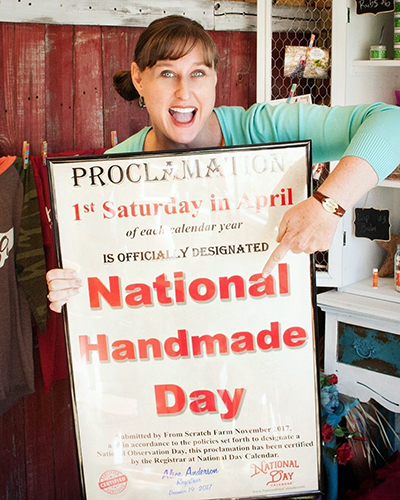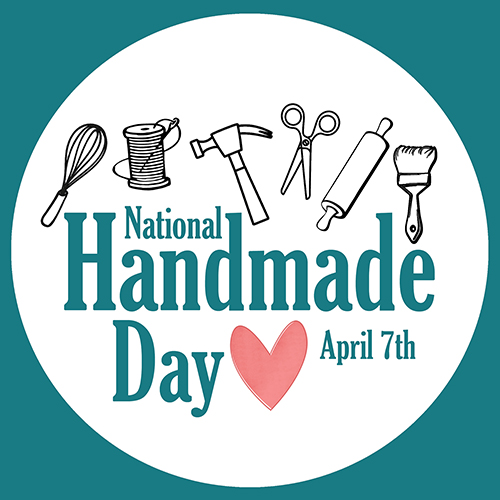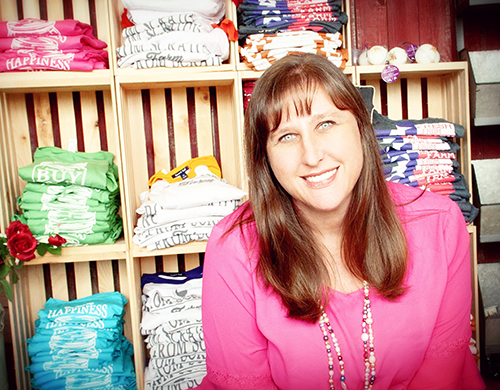I created a national holiday, y’all! Me!
I proposed my idea, made its case, paid the processing fee, and waited.
It was so exciting to hear back from them, that from now on, the first Saturday in April will always be National Handmade Day!!!!!!!!!!!!!!!!!!!!!!
Because our time, sewing, pouring, sanding, making, our love, mixing, formulating, quilting, soldering, dreaming, our dedication, and our blood, sweat, and tears all needs to be recognized and honored!
Some things I learned from my first National Handmade Day?
My customers rock. I had the doors open from noon to 6:00, and had lots of people walk through the doors to shop. They come through for me!
National Day Calendar did a write-up on this. The page is here!
Jo-Ann Fabric was celebrating too. Check that out here!
And my favorite blog post gave a wonderful write- up on the importance of buying handmade. Linking to it here! But also wanted to have Megan’s text in our post:
“Today is April 7th, and it’s also National Handmade Day. I know many of the “national holidays” made up by social media are are just for laughs and entertainment, but this one is more important. Of course it holds value to me, because I am a small business owner who predominantly sells handmade goods. But I’m going to explain in this post why handmade should be important to each of us!
WHY HANDMADE MATTERS:

HANDMADE ITEMS ARE MORE SUSTAINABLE
Handmade products can almost never compete with mass-produced products on price. Almost all of us know we can find goods at big-box retailers or on Amazon for a lower price than what we find from local businesses & makers. But these large retailers that sell mass-produced products are often able to charge less for their products by outsourcing labor and production to developing countries around the world that don’t have the same wage, labor, and safety regulations that we have in our country. By buying & supporting handmade products, you can be assured that workers, their health, and safety were not exploited in the production process.
We’ve all experienced the disappointment of having a product wear out or break prematurely. So often mass-produced goods are have a short lifespan or are specifically designed to become outdated so that consumers are forced into purchasing future updates or newer versions.
Handmade items also are predominantly made by human hands, not machinery. Because of this fact, handmade products usually require far less energy to produce than assembly-line style mass produced items. Additionally, if the handmade item is produced domestically, it doesn’t have the same carbon footprint as goods requiring overseas shipping.
BUYING HANDMADE SUPPORTS THE LOCAL ECONOMY
Buying handmade puts money back in the pockets of the people who live and work in your local area…who in turn, often spend and invest that money back into the community. Anytime you support a local business or maker instead of a large corporation, more of the profit stays in the local community. In addition, supporting local, handmade businesses also creates more jobs within the community!
SUPPORTING HANDMADE KEEPS CRAFT SKILLS ALIVE
Even in the years that I worked in the jewelry industry in NYC, I saw human jobs get replaced with machines and technology. Laser cutting has replaced labor-intensive hand cutting. 3D printing has replaced tedious hand-carving. Online modeling software has replaced technical drawing. The advances in manufacturing are both a blessing and a curse. I’ll admit that I love using 3D technology when making the wax models for my jewelry! But as more and more improvements are made to manufacturing equipment and technology, less people will be trained to manufacture products by hand. In art school and at most jewelry classes that I’ve attended, I’ve learned the traditional technique prior to being able to take the shortcuts and conveniences that our modern world allows. By supporting handmade businesses, those traditional craft skills are able to stay alive and hopefully get passed on to future generations.
BUYING FROM SMALL MAKERS ALLOWS FOR MORE CUSTOMIZATION / PERSONALIZATION
Customization is not something that large corporations, big box retailers, or mass-manufacturers are often able to offer. When you buy handmade, often the maker is able to take requests for modifications, alterations, personalization, and customization. Having a good or product that is tailor-made to your exact liking is so special! We tend to value and care for custom or one-of-a-kind items more because we understand the thought and care that went into making them to our preferences. Buying handmade also presents a great gift giving opportunity, because you can have a gift made with that exact person in mind- which shows extra effort and love.
HANDMADE ITEMS ARE TYPICALLY QUALITY-MADE
Mass produced items are often made as cheaply as possible to maximize profit and reach. Your satisfaction in that manufactured product has no profound or immediate effect on the person who created it.
When I worked as a designer for large brands with internationally sold merchandise, I got paid each week and never was aware of or concerned with our customer’s individual experiences with the products that I helped to create. But that’s because I was always working over a calendar year ahead to keep up with the pace of the fashion industry. By the time the products that I had designed came out, those items were literally archived years earlier in my memory and replaced with more pressing matters. If they didn’t sell well or were returned to stores, it wasn’t even a blip on my radar. Or if it was a big enough problem, I shared the responsibility not only with fellow designers, but also with the product merchandising team, the product development team, the factory workers, their suppliers, etc. The problem was so diluted.
With handmade products, the person who conceives the product is often the same person who crafts it, packages it, markets it, sells it, and serves as the customer service touchpoint. The makers of handmade products have a LOT more invested in their customer’s satisfaction. The profit from that one product is how that craftsperson makes their livelihood and how they support their families & employees. It is a big deal to them if you have to return your product. Because of that, handmade products are typically made with exceptional care and craftsmanship… and typically with high quality and even locally sourced materials (or ingredients).
BUYING HANDMADE SUPPORTS CULTURE, STORYTELLING, & INDIVIDUALISM
Art and craft often take a backseat to more “important” or lucrative subjects like math or science. I can remember the puzzled and concerned expressions I would receive when I was seventeen and college acceptance letters were arriving to my peers… and I would tell people that I was going to art school. While arts and crafts may not have the economic significance of other industries, they are still important. Culture and history rely on artists and crafts people to help tell our story. As humans, we have always been storytellers. It’s how we share observations of our world, pass on information, values, ideas, our history, etc. Creativity is an innate desire, but it is also something that can be learned and finessed. The desire exists in so many of us! It’s like an itch that you have to scratch. The more you ignore it, the more it festers and distracts you from other tasks at hand. The desire to create is something that has existed even in the earliest versions of human history. We’ve all seen archeological images of cave paintings. Even in Genesis, God created man in his image. This act of creation is what made God a God. And it seems like humans often create as a way to understand, observe, explore, improve, or endure our place in a world that we really have such a small understanding of.
WAYS TO SUPPORT HANDMADE:
- Buy handmade products instead of mass produced products.
- Simple word-of-mouth. Tell others about the makers & products that you like!
- Review the handmade products that you purchase and use so that other people can discover and support that maker.
- Look for ways that you can collaborate with small businesses, makers, and artists in your profession or business.
- Engage & Interact with handmade businesses online and via social media. Every like, comment, share, or post helps that maker gain visibility online.
- Explore your community. There’s no telling how many unique makers, businesses, and restaurants you’ll uncover just by acting like a tourist in your own hometown!




